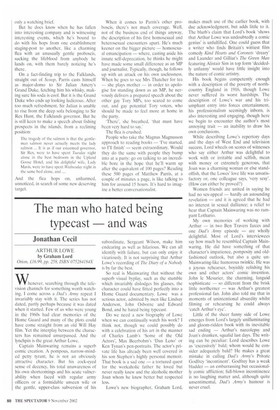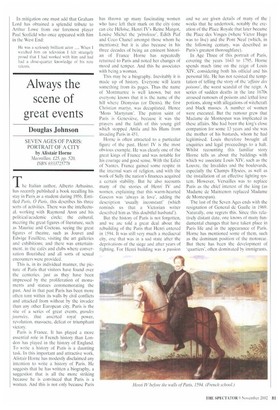The man who hated being typecast and was
Jonathan Cecil
ARTHUR LOWE by Graham Lord
Orion, £16.99, pp, 258, ISBN 075284184X Whenever, searching through the television channels for something worth watching, I come across a Dad's Army repeat I invariably stay with it. The series has not dated, partly perhaps because it was dated when it started. Few of us who were young in the 1960s had clear memories of the Home Guard and many of the plots could have come straight from an old Will Hay film. Yet the interplay between the characters has remained unsurpassed. And the lynchpin is the great Arthur Lowe.
Captain Mainwaring remains a superb comic creation. A pompous, narrow-minded petty tyrant, he is not an obviously attractive character. But his cock-eyed sense of decency, his total unawareness of his own shortcomings and his acute vulnerability when faced with regular army officers or a formidable unseen wife or the gentle, upper-class subversion of his subordinate. Sergeant Wilson, make him endearing as well as hilarious. We can all identify with failure, but can only enjoy it vicariously. It is not surprising that Arthur Lowe's recording of The Diary of a Nobody is by far the best.
So real is Mainwaring that without the superb visual byplay, such as the stumble which invariably dislodges his glasses, the character could have fitted perfectly into a Home Guard documentary. Lowe was a serious actor, admired by men like Lindsay Anderson, John Osborne and Edward Bond, and he hated being typecast.
Do we need a new biography of Lowe when we can continually watch his work? I think not, though we could possibly do with a celebration of his art in the manner of Charles Lamb's 'Some of the Old Actors', Max Beerbobm's 'Dan Leno' or Ken Tynan's pen-portraits. The actor's private life has already been well covered in his son Stephen's highly personal memoir. That book is a sad one — a tortured quest for the workaholic father he loved but never really knew and the alcoholic mother Joan whom he knew better but respected less.
Lowe's new biographer, Graham Lord, makes much use of the earlier book, with due acknowledgment, but adds little to it. The blurb's claim that Lord's book 'shows that Arthur Lowe was undoubtedly a comic genius' is unfulfilled. One could guess that a writer who finds Britain's wittiest film comedy Kind Hearts and Coronets `dreary' and Launder and Gilliat's The Green Man featuring Alistair Sim in top form 'decidedly unfunny' would have little insight into the nature of comic artistry.
His book begins competently enough with a description of the poverty of northcountry England in 1916, though Lowe never suffered its worst hardships. The description of Lowe's war and his triumphant entry into forces entertainment, his professionalism seemingly inborn, is also interesting and engaging, though here we begin to encounter the author's most annoying trait — an inability to draw his own conclusions.
While describing Lowe's repertory days and the days of West End and television success, Lord wheels on scores of witnesses who say either Arthur was delightful to work with or irritable and selfish, mean with money or extremely generous, that Joan was a charming woman or else standoffish, that the Lowes' love life was unsatisfactory or, one colleague says, 'very sexy'. (How can either be proved?) Women friends are united in saying he had no sex-appeal — hardly an astounding revelation — and it is agreed that he had no interest in sexual dalliance; a relief to hear that Captain Mainwaring was no rampant Lothario.
My own memories of working with Arthur — in two Ben Travers farces and one Dad's Amy episode — are wholly delightful. Most of Lord's interviewees say how much he resembled Captain Mainwaring. He did have something of that character's impatience, pomposity and oldfashioned outlook, but also a quite unMainwaring-like humorous twinkle. He was a joyous rehearser, boyishly relishing his own and other actors' comic invention. John le Mesurier, the charming, languid sophisticate — so different from the brisk little northerner — was Arthur's greatest professional fan. John also told me that in moments of unintentional absurdity whilst filming or rehearsing he could always 'catch Arthur's eye'.
Little of the sheer funny side of Lowe emerges from Lord's largely unilluminating and gloom-ridden book with its inevitable sad ending — Arthur's narcolepsy and Joan's drunken, squalid last days. The writing can be peculiar: Lord describes Lowe as 'excessively' bald; whom would he consider adequately bald? He makes a great mistake in calling Dad's Army's Private Godfrey 'incontinent'. Godfrey has a weak bladder — an embarrassing but occasionally comic affliction; full-blown incontinence is no laughing matter and, although quite unsentimental, Dad's Army's humour is never cruel.
In mitigation one must add that Graham Lord has obtained a splendid tribute to Arthur Lowe from our foremost player Paul Scofield who once appeared with him in the West End:
He was a seriously brilliant actor .... When I watched him on television I felt strangely proud that I had worked with him and had had a close-quarter knowledge of his rare talents.



















































































































 Previous page
Previous page